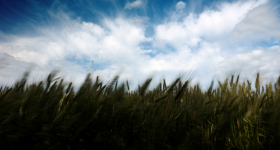The pandemic has awakened us to the risks of travel. But long ago, risks were the norm. In the 1870s, my great-grandfather Liao Entao traveled by boat, landing as a 9-year-old Chinese citizen in America. He was accompanying his father to establish the first HSBC bank in San Francisco. Eventually becoming a career diplomat who would survive three forms of government regimes — imperial, republican and communist — he wrote extensively in poetic form about his travels and work. Later I went to China to research his work and in reading his poetry, the daily life of working as a Chinese official came alive for me.
The detainees of Angel Island were not career diplomats like my great-grandfather, but their writings were a form of diplomacy, a gesture at conveying their feelings and their situation to the western world. They wrote about their longing for home and the tribulations that accompanied hope and ambition for a better life. Their ancestry provided a literary platform — Tang poetry — through which they expressed their frustrations and grievances.
In Wild Geese Sorrow, Jeffrey Leong provides a new translation of the poetry — much of which is largely composed in Tang poetic form by the detained — and written on the walls of the detention center on Angel Island. Wild geese figure in poems #10 and #62. In his notes to #10, Leong writes:
…the poem opens with classical Tang poetic descriptions of nature to thematically explore relationships between self and world. Of particular note is the phrase 雁哀 or “ngan oi” which I’ve translated as “wild geese sorrow,” evoking the loneliness of geese migrating great distances, both leaving from and returning home. The detainees might easily have witnessed migratory waterfowl stopping upon San Francisco Bay while traveling the Pacific Flyway (186).
Leong writes that poems occupied almost every inch of the Angel Island detention center’s barrack walls (21) and that the center’s officials unwittingly preserved the carvings by filling them in with plaster (21). In Island: Poetry and History of Chinese Immigrants on Angel Island 1910-1940, Judy Yung, Genny Lim and the late Him Mark Lai confirm that the putty fillings “served as sealers that helped preserve the wood from further deterioration. Over the years, the putty shrank and the different layers of paint cracked, revealing the carved poems underneath” (37). The voices of the Angel Island poets remained silent until the putty cracked and revealed their presence, and they endure today as a one-sided conversation about their immigrant experience.
In his foreword to Wild Geese Sorrow, David Wojahn writes: “Imagine the scene: it is nearing dawn, and you have spent a sleepless night in your Angel Island barrack, awaiting tomorrow’s interrogation. Your thoughts turn homeward, and they turn to the forms and sensibilities of the Classical Chinese poetry which you studied and memorized in school” (11). Leong’s introduction conveys how Tang poetic technique is crucial to understanding the emotional transference of the poetry carved into the walls of the detention center at Angel Island. Readers of Chinese poetry become quickly aware of the form’s density. Unpacking a line often requires paragraphs of detail and interpretation, which results in the utility and popularity of annotated collections of poetry in China. Analogous to this might be editions of old english poetry where often footnotes occupy more space than the actual poem.
The Song period succeeded the poetry-rich Tang period. The Tang produced poets and verses that continue to be read and recited by children and adults in China, so the form was widely used by immigrants who may have not received much education beyond their teenage years. The Song introduced greater levels of musicality and was the style which my grandfather chose to compose much of his poetry. While the prototypical Tang poem consists of four to eight lines, with five to seven characters per line, Song poems were often composed for singing and looser in arrangement than poems from the previous dynasty. But the concept is similar: they are lyrical and ballad-like in motive. As lyrical forms that do not employ “I,” both styles illuminate subjectivity through descriptions of the natural world, a technique similar to lyric poetry in the west. The poet of these verses inhabits nature and inspires a dream state.
Leong’s introduction builds upon Island’s literary historical context. But the advantage of Leong’s position — since Island is already considered the canonical reference for the wall poetry — is that he could pick and choose the poems he wanted to translate and be brief about his interpretation of their context and format. Leong characterizes the poetry as a triumph of the spirit, writing that “the Angel Island work is also a poetry of resilience, persistence and perseverance and eventually of the spirit’s prevail” (16). Leong also writes that “more difficult for us to understand as Americans with a mere 250 year collective history, is the comfort received by detainees in placing their trials within a literary context of a 4,000-year-old civilization” (21). With skillful use of this style, the authors compact profound emotion into a few words. The unfamiliar associations between the images and their associated emotions require a period of absorption. After learning to follow the rhythm implicit in Leong’s translations, the poems endow the reader with a new sense of how to feel and read simultaneously in their transference of nostalgia.
* * *
Since Island was first published in 1980, it has enjoyed canonical status and scholars continue to rely upon its translations, which emphasize literalism and clarity. Side-by-side comparisons of the Island translations with Leong’s reveal the different advantages each translation offers to the reader, and it’s worth reading both to do justice to the original poetry.
While Leong ruminates on the way in which the night brings out a specific emotional state in human beings, celebrating the atmosphere of deep night. Focusing on meaning, the Island editors titled their translation of one poem “Random Thoughts Deep At Night.” Notably, Leong does not use “random thoughts,” but chooses to explore the colors of late hours and their ability to influence the human being’s emotional state on a cellular level. Here is the Island translation:
In the quiet of night, I heard, faintly, the whistling of wind.
The forms and shadows saddened me; upon seeing the landscape,
I composed a poem.
The floating clouds, the fog, darken the sky.
The moon shines faintly as the insects chirp.
Grief and bitterness entwined are heaven sent.
The sad person sits alone, leaning by a window.
—Written by Yee of Toishan
Using a different strategy, Leong’s translation, titled “Deep Night,” mimics the onomatopoeia provided by Chinese characters and employs more striking language, resulting in a lively translation.
In the still of the night, small sounds are a howling wind.
Shadows, an ache of old wounds, so I recite verse:
Fog and mist drift, a gloomy sky,
Insects rub crick-crack beneath the moon’s frail light
My sad bitter face matches these heavens
A worried man sits alone, leans at the window’s sill.
—Toishan (formerly known as Yee)
The poem’s atmospheric details, “frail light”, "small sounds" and “howling wind,” draw the reader into an experience of night clearly influenced by the pain and loneliness of the speaker. When suffering the heartbreaking realities of being far away from home and missing family in the middle of the night, nostalgia can catch anyone off guard. Transporting the self into nature enables the suspension of reality and the production of imagined consciousness of a flower, a cloud or the moon.
Leong discusses Island but does not elaborate on the choices he makes that differentiate his translations from it; namely, he does not clarify his motivations to pick 70 poems out of the existing 200 wall poems. In addition, the numeric arrangement of the poetry is not aligned in the two publications, so comparing the translations requires a bit of effort. It would have helped if Leong had matched the numeration of the original translations in Island so that readers could source them and compare them to his new translations. For example, poem #26 in Island is poem #33 in Leong’s book. Purchasing electronic copies that are searchable for Chinese characters may make matching them easier, but at the time of writing this review, books for sale existed only in print editions. Compare the stylistic choices between Island and Leong's Wild Geese Sorrow. This is #26 from Island:
The insects chirp outside the four walls.
The inmates often sigh.
Thinking of affairs back home,
Unconscious tears wet my lapel.
Compare this with #33 in Leong:
Outside the four walls, insects chirp,
From the residents inside, many sighs.
When thoughts turn to important family matters,
Without will, tears trickle then soak.
Both poems are literally translated but the translators make choices that alter the meaning of the Chinese characters. For example, the Chinese characters juren actually mean residents, so the Island editors' use of “inmates" was an assertive move in #26, while in the translation in #33 it seems easier to follow the logic of the emotional experience of how thinking about family unconsciously causes the speaker to tear up. In #33, the line “Without will, tears trickle then soak” is quite visually arresting.
In poem #7 in Wild Geese Sorrow, the poet writes:
Little did I know of the suffering in the wood house
The barbarian’s harsh treatment really difficult to accept
Thinking of my family finances, a double stream of tears.
yet I hope to enter San Francisco soon,
Avoid living in this limbo which lengthens all worry. (43)
And in #16 another writes:
Lifting my head, Oakland so close,
Yet I hope to return home to plow and hoe the fields.
Riddled with worry, it’s hard to sleep well,
I depend upon books for lines of verse
to express my broken heart. (63)
Naturally missing home and struggling to adjust to a new culture are themes of the wall poetry. Another refrain is that the hunt for wealth is merely a dream; the real comforts — family, pleasurable meals and drink; friendships — are belatedly recognized as what really matters. They feel reassured by being able to retain language and still conceive of beauty despite their situation. Their human response to the inhuman treatment they received is a salute to Chinese culture — but also poignantly misunderstood by the officials of America denying them entry.
When I read my great-grandfather’s poetry, his subjects — the intensity of his longing for a friend’s presence, a country’s peace, or a carefree night of drinking under the moon — vividly aligned with images of the natural world. A few lines of his poem, “A Banquet in a Splendid City,” demonstrate his nostalgia about Shanghai, from where he was forced to flee in the mid-1940s:
This orphaned harbor is roused by the noise of ancient flutes.
In vain, I recall the earth under the erect and dignified walls of Shanghai.
Where at banquets, guests with jade hairpins converse gracefully while friends gathered together in comfort
With the evening lanterns lit, everyone rings friends to bid farewell to the old month
and welcome the new year.
The pipes played by crowds quake and vibrate the houses
Until chips like snow fall gradually in puffs of cold wind
Carved screens crease to form ripples of waves.
In contrast, down south, men are rushing about
The last line is a reference to oncoming civil war, where men are rushing about to ready themselves for battle. Without exposure to my great-grandfather’s poetry, the public would still have a record of his career but would miss the nuanced emotional landscape of his life.
The crisis of detention has returned to America recently, most apparently with the detainees in Mexico. America is currently confronting its past and current treatment of immigrants, and reading the voices of these Chinese immigrants is a reminder that there is a long and troubled history to immigration policy. This makes Leong’s effort a pertinent one for the present. Leong’s edition provides a fresh view on the poems, which collectively provide an implicit critique of a system which makes immigrants into temporary prisoners and is relevant to readers in light of the fraught debate over immigration in the United States today. Furthermore, Leong’s work points out that, while these poems are vitally important as a historical record of the thoughts and feelings of immigrant Chinese in the late 19th and early 20th centuries, they are also highly valuable as poetic creations. They are more than evidence of existence; they provided solace to their writers and functioned not simply as a kind of stylistic affirmation of presence but also as artifacts of intricately wrought beauty.










Comments